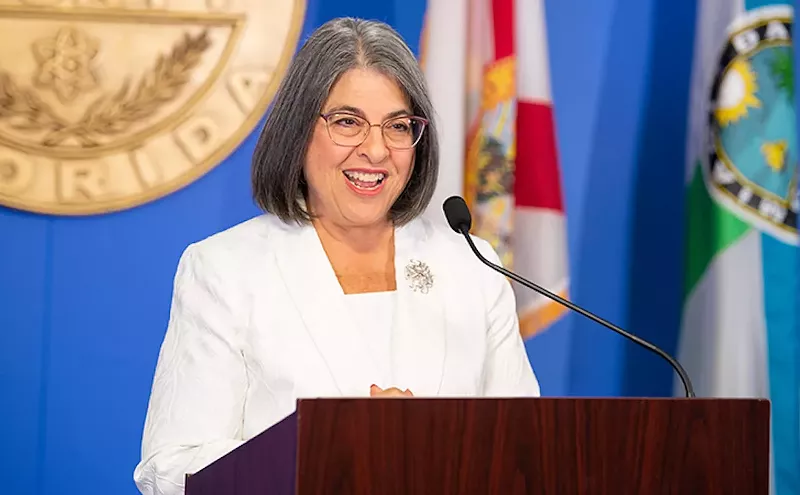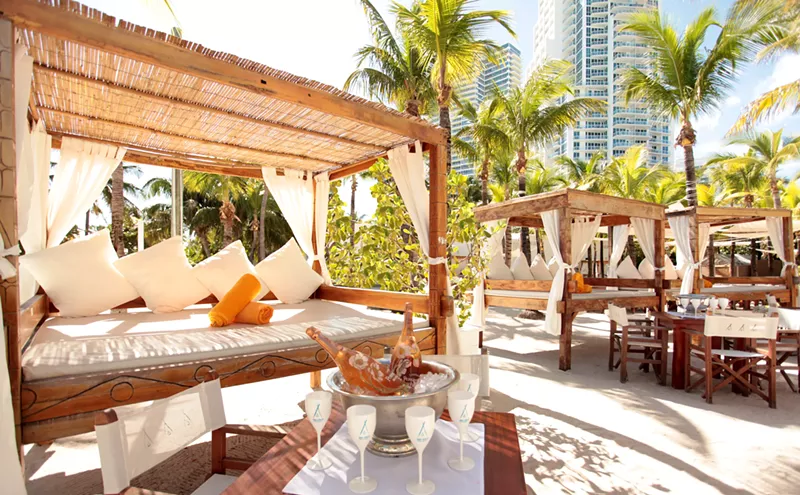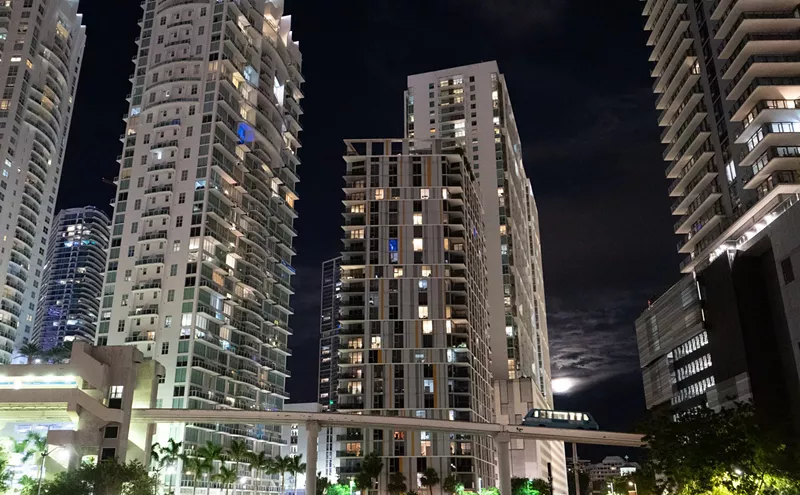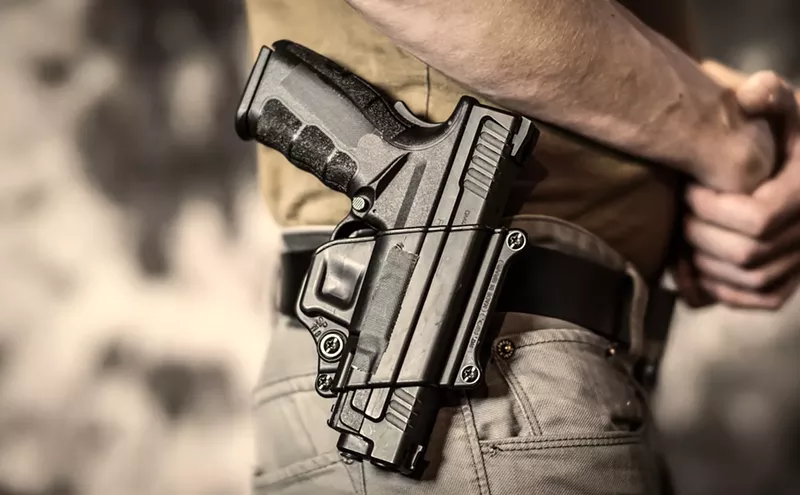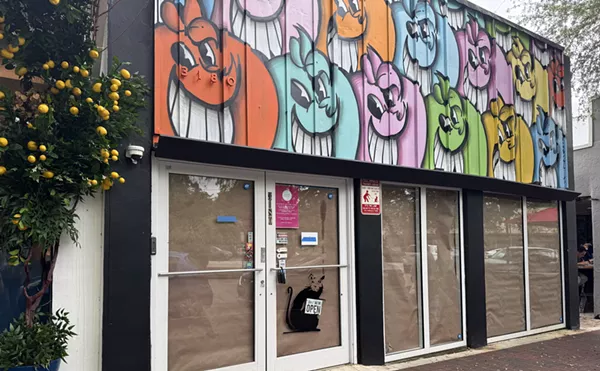Posada himself, at age 77, is a walking slice of Cold War history, better suited to a Graham Greene novel than a dispassionate newspaper account. Declassified U.S. government documents portray a Cuban exile who trained for the ill-fated 1961 Bay of Pigs invasion and quickly landed on the CIA's payroll, an "asset" running covert operations against Fidel Castro throughout the Caribbean, while still finding time to procure explosives for former Las Vegas mobster Frank "Lefty" Rosenthal.
By the Seventies, U.S. policy may have settled into a state of uneasy coexistence with Castro, but not Posada, who is believed to be the mastermind of the 1976 midair bombing of a Cuban airliner that killed 73 people. Imprisoned in Venezuela for that crime, he escaped in 1985, rejoining the CIA in El Salvador in their contra war against Nicaragua's Sandinistas. Posada hardly slowed down for the Nineties, taking credit in a 1998 New York Times profile for planning a series of bombings in Havana hotels that killed a visiting Italian -- an effort to stifle tourism there. Jailed in Panama in 2000 for yet another bombing plot against Castro, he was pardoned in 2004, eventually slipping into Miami this past March, where his attorney announced he'd be applying for political asylum.
Posada's welcome was anything but warm though. While the Cuban and Venezuelan governments angrily demanded his extradition, editorial pages around the country bristled at the notion of offering Posada sanctuary, sourly noting the ease with which he apparently crossed the border and avoided Homeland Security. ABC News's Ted Koppel opined on Nightline that in a post-9/11 environment, "when the U.S. is leading the global war against terrorism, it cannot appear to show tolerance for a man with Posada's background, even though he once worked for the CIA."
Although publicly skeptical that Posada was living underground in Miami, Bush administration officials were quietly reaching out to exile leaders here, attempting to gauge the reaction to deporting him. Was one man's terrorist -- at least in the eyes of that crucial Cuban-exile voting bloc -- another man's freedom fighter? "I believe they wanted a sounding board," state Rep. David Rivera told the Miami Herald of the Bush staffers who'd called him (and whom he refused to identify).
Journalists, meanwhile, feverishly scrambled for an interview with the elusive Posada. Jeffrey Kofman, ABC News correspondent for Florida and Latin America, spent several weeks in tortured negotiations with Miami developer Santiago Alvarez, alternately described as Posada's "friend" or "benefactor," and, most significant, owner of the boat on which Posada was allegedly smuggled from Mexico to Miami. (Posada claims a paid coyote guided him across the Texas border.)
"Very clearly, Alvarez's people wanted to humanize him. They told me that. Their objective was to let people see he's not the Devil," Kofman explains to Kulchur. But Alvarez was insisting on no pictures, only audio (a bit of a liability for a television interview), and on certain subjects being off-limits. "They were struggling for a way to make this only a positive story and not to address the more difficult questions. And it's my job to ask those tough questions. No one's going to tell us as journalists what we can put in a story. "
It was the Herald that landed the exclusive chat with Posada on May 11 at an unidentified Brickell Key condo. The resulting front-page story made it impossible for the U.S. government to continue pretending Posada wasn't in Miami. Strangely, however, in a fugitive-abetting move that appeared to indicate some horse-trading with Alvarez, the Herald's story was held from print until May 17 -- the same day Alvarez told Kofman and other reporters he planned to whisk Posada out of the country, away from U.S. immigration officials and the threat of deportation to Venezuela. (The Herald story was reported by Alfonso Chardy and Oscar Corral, both of whom declined to comment on any dealings with Alvarez, referring questions to Herald city editor Manny Garcia, who did not return two telephone calls.)
But before this disappearing act, Alvarez had planned one last bold PR gambit: a clandestine May 17 news conference featuring Posada and a handful of invited press -- this even as federal authorities finally crawled into action, subpoenaing the New York Times for its 1998 Posada interview tapes.
At the New York Times's Miami bureau, reporter Abby Goodnaugh recalls Alvarez's phone call to her: "'You have to play by our rules'; that was the exact phrase he used." As Alvarez laid out his scheme, which seemed to be lifted from an old spy flick, Goodnaugh says she thought, "This is nuts." A driver would pick her up at a prearranged rendezvous point and take her to a secret location where Posada would wait. She would be allowed only two questions, and neither could address the 1997 Havana hotel bombings. Any cameras had to be submitted to Alvarez's people 24 hours in advance; they'd be handed back at the secret meeting, presumably after they'd been inspected for hidden tracking devices.
"It didn't feel ethically comfortable to me," Goodnaugh says. "I talked to my editor in New York about it and we decided we don't play by that kind of rigid term-setting." Did Alvarez demand she wear a blindfold for the car ride? Goodnaugh laughs, "It wasn't a safety issue. I wasn't worried about being kidnapped. I just felt like I was becoming an accessory to their stunt move." Her story the next day noted she'd refused to attend the press conference "because of the terms, which included being driven by Mr. Posada's associates to an undisclosed location and agreeing to ask questions only on certain topics."
The Chicago Tribune's Gary Marx received the same offer from Alvarez but took a different tack. "I didn't think twice about the ground rules," he says. "A suspected terrorist-in-hiding agreeing to meet with reporters? What more can you say?" Marx promptly flew to Miami from Havana, where he's stationed as the Tribune's Latin-American correspondent. "I also have enough experience to know that ground rules often break down when reporters begin firing questions. Officials refuse all the time to answer questions, so my view was that it would be no big deal if we asked Posada about the hotel bombing and he refused to answer."
For Marx the experience was more surreal than menacing. The morning of May 17 he was bundled into an SUV outside his Miami hotel, along with a CNN crew and a Sun-Sentinel reporter. Cell phones were confiscated; then they were driven to a cavernous Hialeah warehouse, where "a half-dozen beefy guys" in dark sunglasses guarded the door. After the rest of the twenty or so invited reporters had been delivered to the warehouse from various sites around town -- and camera equipment collected the day before had been returned to the TV crews -- Posada entered. Nattily attired in a white summer suit and navy tie, Marx felt he looked "more like a Florida retiree than a feared terrorist."
True to Marx's hunch, the gathering soon became a free-for-all, almost comically so. Sitting calmly behind an old wooden table, an interpreter at his side and Alvarez hovering nearby, Posada began by insisting that morning's Herald interview with him was based on an "off the record" conversation. Then, calling the 1976 airline bombing "abominable," he brandished a lie-detector test that supposedly cleared him of any involvement in it. He was no terrorist, he offered earnestly: "My only objective is to fight for the freedom of my country."
But members of the press corps were growing restless with Posada -- and with each other. As one reporter began bantering with Posada in rapid-fire Spanish, several Anglo TV correspondents groaned, turning frantic in their quest for usable sound bites. "We need it in English!" hollered one repeatedly, though Posada was virtually unintelligible in any language. A 1990 assassination attempt in Guatemala (Posada blames Cuban agents) had sent bullets slicing through his jaw and tongue, leaving his speech little more than a gravelly rasp. Eventually Posada mustered a solid English quip, only to have the roar of a nearby passing train drown him out.
Kofman waded into the muddled fray with his question -- the strictly forbidden one -- but he was barely able to utter the words "hotel bombings" before Alvarez cut him off. "We're answering questions about the planes only and about this situation here," he snapped as Posada sat mutely. Kofman pressed on and Alvarez shot back that his questions were "not relevant."
Kofman, who says he never agreed to any query restrictions, recalls this back-and-forth as truly bizarre. "If he's going to talk about his involvement in alleged terrorist acts, he can't pick the ones he talks about: 'I'll tell you about this bombing but not that one.' They're trying to protect him like he's a pop star." Kofman was also distressed by the behavior of CNN's Susan Candiotti, who chose to deploy Oprah Winfrey's warm and fuzzy approach, gently asking Posada: "Are you a monster?"
"Look at my face," Posada replied, smiling at Candiotti as laughter broke out. "Do I look like a monster?"
The exchange made Kofman cringe. "If you've covered, as I have, stories of war criminals, old people never look like they've done horrible things," he says. "But that doesn't mean in their past, when they were younger and more spry, they haven't been capable of horrendous things. [Posada] looks very dapper in his linen suit, and he showed a sense of humor. He can be a charming man to spend time with. But that isn't the reason we're there. The reason we're there is that this is a man who has been implicated in terrorist acts, who has publicly admitted to his involvement in terrorist acts, and who is trying to get residency in a country that says it has no room for anyone with a terrorist past. That's the issue."
In the end, Alvarez's cloak-and-dagger maneuvers came to naught. Two hours after the media circus, as Posada was packing his belongings in a safe house and preparing to leave the country, he was nabbed by federal agents. He's now being held at a detention center in El Paso, Texas, awaiting a June 13 hearing.
Yet the proverbial other shoe never dropped. That feared explosion from el exilio on the streets of Little Havana? It never materialized.
Not that there wasn't a reservoir of support for Posada. A host of reporters, from National Public Radio to the Toronto Star, dutifully made the de rigueur trek to that old-school symbol of cubanismo, the sidewalk coffee window at Calle Ocho's Versailles restaurant, where they found plenty of kind words for Posada and pleas to leave the elderly anti-Castrista be.
Fidel Castro certainly played out his part of the mass-hysteria script, labeling Bush a "fascist," decrying the "Miami Mafia," and comparing Posada to Osama bin Laden as he led a so-called "volunteer" march of hundreds of thousands of protesters in Havana. Adding a dash of intrigue, he read aloud a private 1998 letter from author Gabriel García Márquez that detailed the author's role as a back-channel envoy between Castro and President Bill Clinton on the Posada matter.
On this side of the Florida Straits, however, folks weren't taking the bait. Beyond a few hotheads, sympathy for Posada remained just that -- a lingering soft spot for a man and a philosophy whose time had clearly passed. "As reporters we have to get beyond the stereotype that certain places like Versailles restaurant play into," ABC's Kofman argues. "Yes, people were watching to see if this was going to be another Elian, but this is a different community now."
That difference was on display exactly one week after Posada was grabbed by the feds. As the aging cold warrior sat in a Texas lockup, Miami Mayor Manny Diaz delivered his state-of-the-city address. Yet Diaz, an attorney who gained local fame representing Elian Gonzalez's Miami relatives during their custody battle and who rode that notoriety into office in 2001, didn't mention Castro or Cuba once in his entire 2300-word speech. And unlike his mayoral predecessor, he didn't refer to his opponents as likely communist agents.
Diaz did name-check José Martí, but not in the nineteenth-century Cuban poet's traditional role of prefacing a directive to liberate la patria. Instead Diaz invoked Martí as a call to eliminate Miami's "sad distinction" as one of the poorest cities in America. Elsewhere in America it might be old news that a mayor would promise to concentrate on curing his city's ills instead of worrying about some foreign land. But in Miami, it's downright revolutionary.



